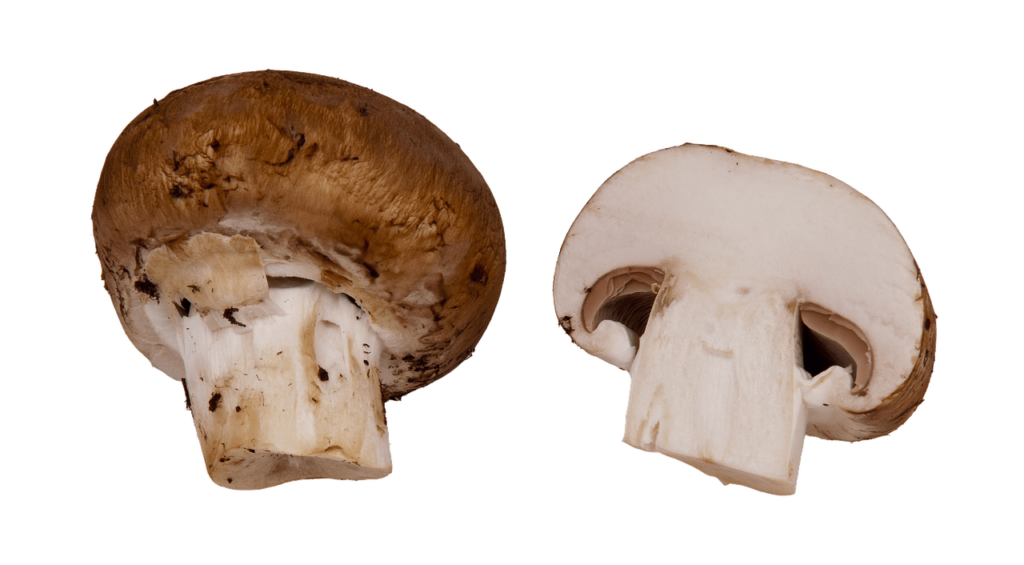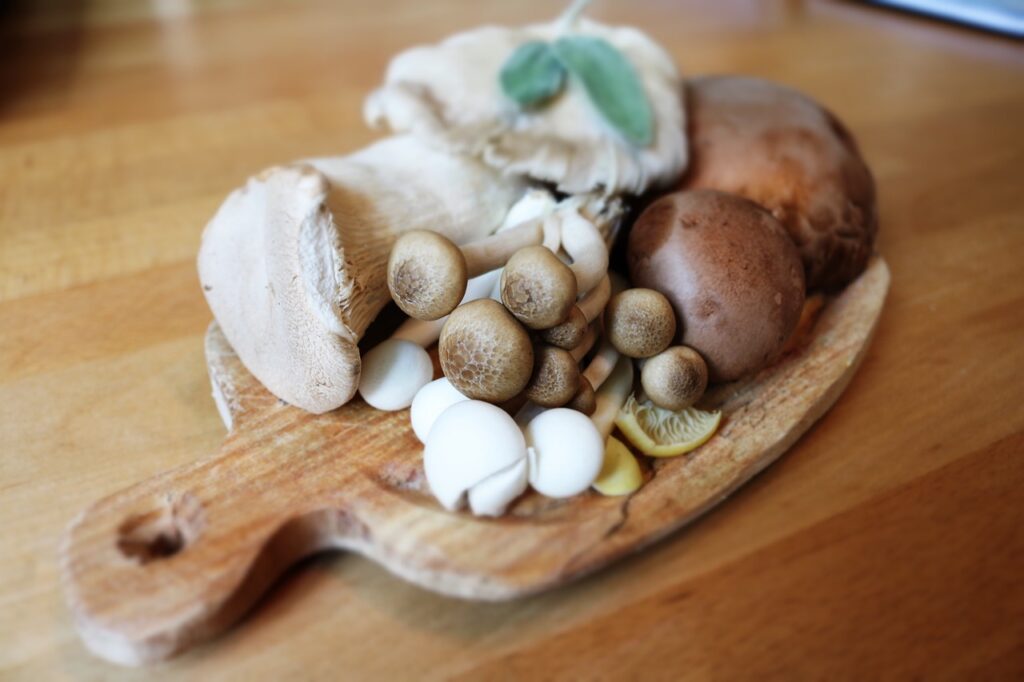Have you ever wondered if mushrooms are worth including in your diet? In this article, we will explore the nutritional value of mushrooms and uncover their potential health benefits. From essential vitamins and minerals to their low calorie content, mushrooms might just surprise you with their impressive nutritional profile. So, if you’re curious about the potential benefits that these fungi have to offer, keep reading! Yes, they absolutely do! Mushrooms are not only a delicious addition to any meal, but they also pack a powerful nutritional punch. In this article, we will explore the macronutrient composition, vitamins and minerals, fiber content, antioxidants, and the potential health benefits of mushrooms. We will also discuss different types of nutritious mushrooms, compare mushrooms to meat and vegetables in terms of nutrition, and explore the effects of cooking on nutrient retention. By the end of this article, you will have a comprehensive understanding of the nutritional value of mushrooms and why they should be a staple in your diet.

Macronutrient Composition
Calories
When it comes to calories, mushrooms are a great choice. They are low in calories, making them an excellent option for those who are watching their weight or trying to maintain a healthy lifestyle. For example, one cup of sliced white mushrooms contains just 15 calories. This means you can enjoy a generous portion of mushrooms without worrying about excessive calorie intake.
Protein
Mushrooms may not be the first food that comes to mind when you think of protein, but they are surprisingly a good source. While the protein content may vary slightly depending on the type of mushroom, they generally contain about 2-3 grams of protein per one cup serving. This makes mushrooms a valuable addition to vegetarian or vegan diets, as they can help meet the daily protein requirements.
Fat
Mushrooms are naturally low in fat, making them a nutritious choice for those looking to reduce their fat intake. Most of the fat in mushrooms is the healthy unsaturated kind, which is beneficial for heart health. So, feel free to enjoy mushrooms without any guilt!
Carbohydrates
When it comes to carbohydrates, mushrooms are relatively low. One cup of sliced mushrooms contains just 2-3 grams of carbohydrates, making them a suitable option for individuals following low-carb or ketogenic diets. Additionally, mushrooms are a good source of dietary fiber, which we will discuss in more detail later in the article.
Vitamins and Minerals
Vitamin D
Vitamin D is an essential nutrient that plays a crucial role in various bodily functions, including bone health, immune system function, and mood regulation. While mushrooms are not a significant source of vitamin D, they do have the ability to produce it when exposed to sunlight. It is recommended to place mushrooms in direct sunlight for about 15-30 minutes to increase their vitamin D content.
B-Vitamins
B-vitamins are important for energy production, brain function, and maintaining a healthy metabolism. Mushrooms are a good source of several B-vitamins, including riboflavin (B2), niacin (B3), and pantothenic acid (B5). These vitamins are essential for the proper functioning of the body and can contribute to overall health and well-being.
Copper
Copper is an essential mineral that plays a crucial role in energy production, immune system function, and the formation of connective tissues. Mushrooms are a good source of copper, providing about 15-20% of the recommended daily intake per one cup serving. Including mushrooms in your diet can help ensure an adequate copper intake.
Potassium
Potassium is a mineral that is essential for maintaining proper heart, muscle, and nerve function. It also helps regulate blood pressure and balance fluids in the body. Mushrooms are a good source of potassium, with one cup providing around 10% of the recommended daily intake. Adding mushrooms to your meals can contribute to maintaining healthy potassium levels.
Selenium
Selenium is a powerful antioxidant that plays a crucial role in supporting immune function and protecting the body against oxidative stress. Mushrooms are one of the richest food sources of selenium, with the amount varying depending on the type of mushroom. Including selenium-rich mushrooms in your diet can be beneficial for overall health and well-being.
Zinc
Zinc is an essential mineral that is crucial for immune function, wound healing, and DNA synthesis. Mushrooms contain small amounts of zinc, making them a valuable addition to a balanced diet. Zinc plays a key role in maintaining optimal health, and incorporating mushrooms can help meet your zinc needs.
Phosphorus
Phosphorus is a mineral that is vital for proper bone and teeth formation, as well as energy production and cell function. Mushrooms contain phosphorus in moderate amounts, and regularly consuming them can contribute to a well-rounded phosphorus intake.
Iron
Iron is a mineral that is essential for carrying oxygen throughout the body and preventing iron-deficiency anemia. While mushrooms are not a significant source of iron, they do contain a small amount that can contribute to your overall iron intake. Pairing mushrooms with iron-rich foods can enhance iron absorption.
Fiber Content
Chitin
Fiber is an essential nutrient that plays a crucial role in digestion, blood sugar management, and maintaining a healthy weight. Mushrooms contain a unique type of fiber called chitin, which has been shown to have potential health benefits. Chitin can help improve gut health by acting as a prebiotic, promoting the growth of healthy gut bacteria.
Beta-Glucans
Beta-glucans are a type of soluble fiber that can help reduce cholesterol levels, improve immune function, and regulate blood sugar levels. Mushrooms, particularly varieties like shiitake and maitake, are high in beta-glucans. Including these mushrooms in your diet can provide you with the benefits of this valuable fiber.
Antioxidants
Ergothioneine
Ergothioneine is a powerful antioxidant that is unique to mushrooms. It helps protect cells from oxidative damage caused by free radicals and plays a role in overall health and well-being. Regularly consuming mushrooms can contribute to your overall antioxidant intake and support optimal health.
Selenium
As mentioned earlier, selenium is a potent antioxidant that plays a crucial role in protecting the body against oxidative stress. In addition to its antioxidant properties, selenium also supports immune function and thyroid health. Including selenium-rich mushrooms in your diet can be an effective way to boost your antioxidant intake and support overall health.
Phenols
Phenols are a type of antioxidant that can help neutralize harmful free radicals in the body. Mushrooms contain different phenolic compounds that contribute to their antioxidant activity. Incorporating a variety of mushrooms into your diet can provide a diverse range of phenols and enhance your overall antioxidant capacity.

Mushrooms and Immunity
Beta-Glucans
Beta-glucans, which we discussed earlier in the fiber section, are not only beneficial for their fiber content but also for their immune-boosting properties. They have been shown to stimulate the immune system, enhance the activity of immune cells, and improve overall immune function. Regularly consuming mushrooms rich in beta-glucans, such as shiitake and maitake, can help support a healthy immune system.
Ergothioneine
In addition to its antioxidant properties, ergothioneine has also been found to have immune-enhancing effects. It helps regulate the immune response and can aid in fighting off infections and protecting against chronic diseases. Incorporating ergothioneine-rich mushrooms into your diet can provide additional support to your immune system.
Selenium
Selenium, as mentioned before, plays a crucial role in immune function. It helps support the production and activity of immune cells, making the body more resilient against infections and diseases. Mushrooms are an excellent source of selenium, and their inclusion in your diet can contribute to a robust immune system.
Vitamin D
Vitamin D is essential for a healthy immune system. It helps regulate immune cell function and supports the body’s defense against pathogens. While mushrooms are not a significant source of vitamin D, you can increase their vitamin D content by placing them in direct sunlight for a short period. This simple step can help boost your vitamin D levels and benefit your immune health.
Potential Health Benefits
Boosting Immune System
As we have discussed, mushrooms offer various components that can improve immune function. Regular mushroom consumption can play a role in strengthening your immune system, making you more resilient to infections and diseases.
Cancer Prevention
The antioxidant properties of mushrooms, along with their immune-enhancing effects, make them a potential ally in cancer prevention. Research suggests that regularly consuming mushrooms may help reduce the risk of certain types of cancers, such as breast cancer and prostate cancer. While more studies are needed, adding mushrooms to your diet can be a simple and flavorful way to support your overall health.
Blood Sugar Management
The fiber content of mushrooms, particularly beta-glucans, can help regulate blood sugar levels. They slow down the absorption of carbohydrates and prevent rapid spikes in blood sugar. This can be beneficial for individuals with diabetes or those looking to maintain stable blood sugar levels.
Heart Health
Mushrooms are low in fat and cholesterol, making them heart-healthy food choices. Additionally, their fiber content and antioxidant properties contribute to cardiovascular health. Including mushrooms in your diet can be part of a heart-healthy eating plan that supports overall cardiovascular well-being.
Brain Health
The B-vitamins found in mushrooms, particularly niacin and riboflavin, play a crucial role in brain health. They help support cognitive function and can contribute to maintaining healthy brain aging. Including mushrooms in your diet can provide these essential vitamins and support optimal brain health.
Weight Management
Mushrooms are low in calories and fat while being high in fiber, making them a valuable addition to a weight management plan. Their high water content and the feeling of fullness they provide can help curb hunger and contribute to a balanced and satisfying diet.

Types of Nutritious Mushrooms
Shiitake
Shiitake mushrooms are not only delicious but also highly nutritious. They are a good source of B-vitamins, fiber, and potassium. In addition, shiitake mushrooms contain a compound called lentinan, which has been shown to have immune-boosting and anti-cancer properties.
Maitake
Maitake mushrooms, also known as “hen of the woods,” are another nutritious mushroom variety. Like shiitake mushrooms, they are rich in B-vitamins, potassium, and fiber. Maitake mushrooms also contain a compound called beta-glucan, which we discussed earlier and has various health benefits.
Oyster
Oyster mushrooms are not only tasty but also pack a nutritional punch. They are a good source of B-vitamins, copper, and iron. Oyster mushrooms have a delicate flavor and a velvety texture, making them a versatile ingredient in many dishes.
White Button
White button mushrooms are the most commonly consumed mushroom variety. While they may be small, they are not lacking in nutritional value. They are a good source of B-vitamins, copper, and selenium. White button mushrooms have a mild flavor that pairs well with a variety of cuisines.
Portobello
Portobello mushrooms are matured white button mushrooms and are known for their large size and meaty texture. They are a good source of B-vitamins, potassium, and selenium. Portobello mushrooms are often used as a meat substitute in vegetarian or vegan dishes due to their hearty texture.
Nutritional Comparison
Mushrooms vs. Meat
While mushrooms are not a significant source of protein compared to meat, they can still be a valuable addition to a balanced diet. However, mushrooms are much lower in calories, fat, and cholesterol compared to most types of meat. By incorporating mushrooms into your meals, you can reduce your overall calorie and fat intake while still enjoying a satisfying and flavorful meal.
Mushrooms vs. Vegetables
Mushrooms offer a unique nutritional profile compared to other vegetables. While they are low in calories and carbohydrates, they are relatively higher in protein and fiber. The fiber in mushrooms, particularly the beta-glucans and chitin, acts as a prebiotic and supports gut health. By adding mushrooms to your vegetable dishes, you can enhance their nutritional value and enjoy a more diverse range of nutrients.

Cooking and Nutrient Retention
Cooking Methods
The way mushrooms are cooked can affect their nutrient content. To retain the maximum nutritional value, it is recommended to cook mushrooms using methods that involve less frying or boiling. Sautéing, grilling, or baking mushrooms can help preserve their nutrients while bringing out their flavors.
Nutrient Loss
While mushrooms are generally nutrient-dense, some vitamins can be lost during cooking. Water-soluble vitamins like vitamin C and B-vitamins are especially vulnerable to loss when exposed to high heat or prolonged cooking. To minimize nutrient loss, it is best to cook mushrooms using shorter cooking times and lower temperatures.
Conclusion
In conclusion, mushrooms are not only a delicious addition to your meals but also a highly nutritious food. They offer various macronutrients, including protein, good fats, and low-carbohydrates. Mushrooms are also a rich source of vitamins and minerals, such as B-vitamins, copper, selenium, and potassium. Their fiber content, antioxidants, and immune-boosting compounds make them a valuable food for overall health and well-being. Incorporating mushrooms into your diet can support immune function, cancer prevention, blood sugar management, heart health, brain health, and weight management. With different types of nutritious mushrooms to choose from, such as shiitake, maitake, oyster, white button, and portobello, you can enjoy a variety of flavors and textures while reaping the nutritional benefits. So, next time you go grocery shopping, make sure to grab some mushrooms and get creative in the kitchen to enjoy their countless health benefits.


No Responses